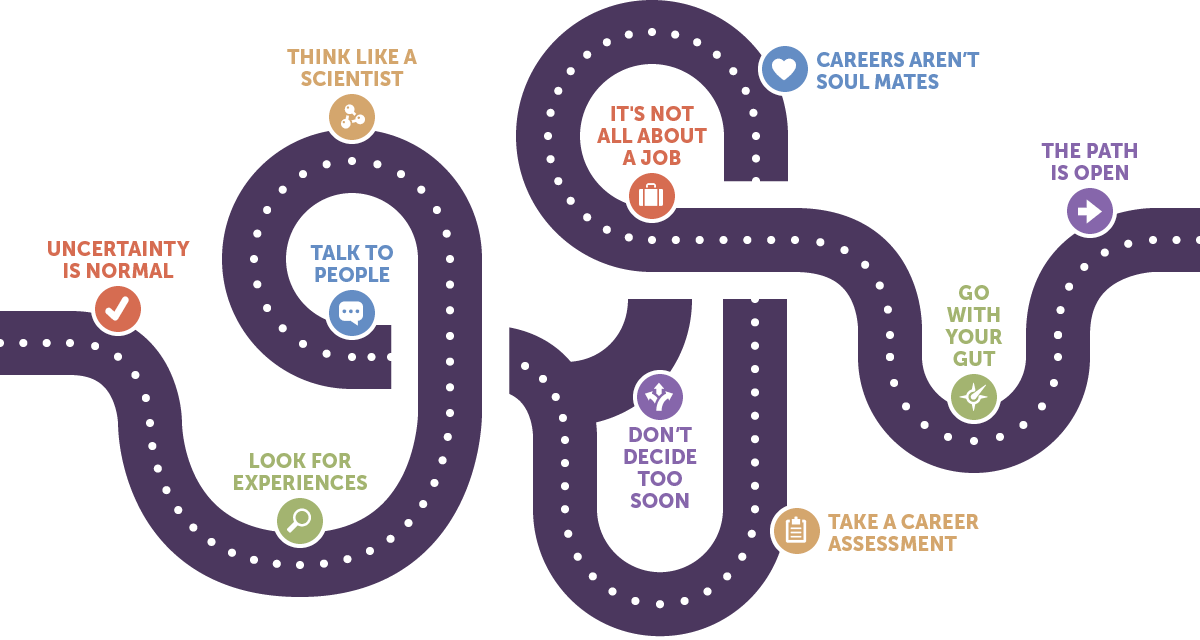Moving forward and Exploring the Open Path
to your interests, your major, your life.
by Emily Carpenter

Know that
it’s really normal.
It can feel like everyone else knows, but even the students who say they know what they want to major in are often uncertain. According to a 2019 Ellucian survey, nearly half of all incoming students are uncertain and almost two-thirds of students feel overwhelmed by the process of selecting a major.
Look for a college
that is all about experience.
Find a college that builds first-hand experiences into its approach and encourages you to start exploring early — ideally, as early as your first year. Ask: Can I do multiple internships? How many students do internships and other similar experiences? Will projects with real-life organizations be part of your classes? Do student employment positions offer a chance to learn something new? How do faculty involve students in research and conference participation?
Think like a scientist
(even if science isn’t your thing).
Keep testing and trying with an open mind. This isn’t being wishy-washy; it’s actually growth that is based on solid experience and evidence. In Adam Grant’s 2021 book, Think Again, he recommends approaching life like a scientist, staying open and excited when learning something new, even when we find that something didn’t go as planned. This means you should try a new club, push yourself to meet new people, or take a class even if you aren’t sure you’ll be good at it.
Resist the urge
to decide too soon.
Sometimes it can feel easier to just go with the flow and pick something that sounds good, but that often backfires in the end. “Identity foreclosure” can happen when we commit to something without first exploring options. It often leads to having to start over later or feeling as though you’ve missed opportunities.
Take a career
assessment.
Assessments are not magic and can’t predict your future, but they can be useful tools to start the conversation. Many good assessments link to labor market data and trends, which provides a sense of salary and growth potential in the field. Assessments can help you both (1) rule out options that aren’t a good fit and (2) expose you to new options to consider. The Department of Labor offers a free online assessment tool called O-Net.
Careers aren't
soul mates.
It’s likely that there are many, many jobs that you will enjoy and that can also pay your bills. The world of work changes fast, and there will be new opportunities that intrigue you down the road. Instead of asking the pressure-filled question of “What do I want to do for the rest of my life?” ask yourself “What do I want to do first?” It’s well-documented that college graduates earn significantly more than high school graduates over a lifetime regardless of major, but you can also research differences between majors if earning power is important to you.
Is this about being
able to get a job?
If this decision is stressing you out because you’re worried about being employed after graduation, it might be helpful to know that it’s really not all about your major. Recruiters heavily weigh other factors such as internship experiences (research shows that this factor is actually more important than your major), leadership positions, general work experience, involvement on campus, and GPA (NACE Job Outlook 2022). All the more reason to get involved and gain experience.
Talk to people.
Lots of people.
Start small and informally by talking to older friends and relatives about how they decided on a major or career path. If you don’t know someone in your field of interest, ask your school counselor or teachers if they know someone. Here’s a secret: people usually like to talk about themselves and share their story. Remember, though, that advice is often autobiographical, so talk to lots of people and get different perspectives because there are almost always multiple paths to an end destination. If this step still makes you nervous, check out RoadTrip Nation for a curated list of really interesting people telling their career stories.
Go with your gut and
see where it leads.
Chances are you had a favorite subject (or two or three…) in school. Or, maybe there’s something that’s always intrigued you but you never had time to explore. Delve deeper into those things that capture your interest most by taking a class. Explore a workshop at a community learning center or take a look at online learning resources like LinkedIn Learning, TED, or even YouTube. As you learn more about a special subject, it’s likely that you’ll discover related subjects that you’d previously been unaware of. Each step, each new discovery can widen your perspective on ideas for what to major or minor in at college as well as potential career paths.

Emily Carpenter, author, is the associate vice president for experiential impact and oversees the Nazareth University Center for Life’s Work.
Nearly one in six Nazareth first-year students begin college unsure about their major, and during college, nearly one in three students change majors. At our Center for Life's Work, career coaches partner with students as early as the summer before their first year to connect with mind-opening new experiences that successfully focus goals and launch careers.
Our experiential learning approach lets students explore different career options and "try them on for size," getting first-hand exposure and a view on whether it's the right path for them.
For beginning college without declaring a major first, our Undeclared: Open Path Program provides an effective structure that supports exploration. Ongoing and enriched guidance, countless options for experiential learning, and meaningful connection to a community of other exploration-minded students leads to success for our Undeclared: Open Path students.
Additionally, in our small campus environment, Nazareth students find a host of resources and professionals who provide personalized and proactive support to help them thrive.
Sources:
Brody, Kristen and Hershbein, Brad. “Major decisions: What graduate earns over their lifetimes.” Brookings, https://www.brookings.edu/blog/up-front/2020/10/08/major-decisions-what-graduates-earn-over-their-lifetimes/. 2020.
Grant, Adam. Think Again. Viking, 2021.
“Identify Development Theory.” lumen, https://courses.lumenlearning.com/adolescent/chapter/identity-development-theory.
“o*net Interest Profiler.” My Next Move, https://www.mynextmove.org/explore/ip.